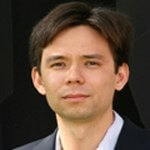News
CAMBRIDGE, Mass. - January 29, 2008 - Ken Crozier, Assistant Professor of Electrical Engineering in the Harvard School of Engineering and Applied Sciences (SEAS), has won a Faculty Early Career Development (CAREER) award from the National Science Foundation (NSF). The honor is considered one of the most prestigious ways to recognize rising stars in science and engineering.
Crozier's current research focuses on experimental studies in nanophotonics. In particular, he is exploring near-field optical imaging techniques for spectroscopy with a spatial resolution significantly better than the classical diffraction limit. He is also interested in demonstrating new optical components based on photonic crystals. Crozier has published on microfabrication, scanning probe microscopy, and photonic crystals.
He studied Electrical Engineering and Physics at the University of Melbourne, Australia, where he received his B. Eng. with First Class Honors (1995) and B.S. (1996). He completed both his M.S.E.E. (1999) and Ph.D. (2003) in Electrical Engineering from Stanford University. Crozier carried out his doctoral dissertation under Calvin Quate and Gordon Kino. Prior to coming to Harvard, he worked as a postdoctoral researcher at Stanford with Olav Solgaard.
At Stanford, Crozier received the Leland T. Edwards Fellowship and the Burt and Deedee McMurtry Stanford Graduate Fellowship. At the University of Melbourne, he received the L.R. East Medal from the Institution of Engineers, Australia, and the Rowden White Prize in Engineering. He is a member of the IEEE.
###
About the Faculty Early Career Development (CAREER) Program
The Faculty Early Career Development (CAREER) Program is a Foundation-wide activity that offers the National Science Foundation's most prestigious awards in support of the early career-development activities of those teacher-scholars who most effectively integrate research and education within the context of the mission of their organization. Such activities should build a firm foundation for a lifetime of integrated contributions to research and education. NSF encourages submission of CAREER proposals from junior faculty members at all CAREER-eligible organizations and especially encourages women, members of underrepresented minority groups, and persons with disabilities to apply.
Cutting-edge science delivered direct to your inbox.
Join the Harvard SEAS mailing list.
